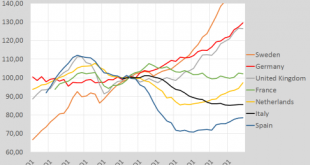When ignorance is bliss The production function has been a powerful instrument of miseducation. The student of economic theory is taught to write Q = f(L, K) where L is a quantity of labor, K a quantity of capital and Q a rate of output of commodities. He is instructed to assume all workers alike, and to measure L in man-hours of labor; he is told something about the index-number problem in choosing a unit of output; and then he is hurried on to the next...
Read More »The ultimate insider
[embedded content] One of my absolute favourite movies. Great, true, story. Marvelous actors — Russell Crowe, Al Pacino, Christopher Plummer. Fabulous music by e.g. Lisa Gerrard and Jan Garbarek. div{float:left;margin-right:10px;} div.wpmrec2x div.u > div:nth-child(3n){margin-right:0px;} ]]> Advertisements
Read More »What so many critiques of economics gets right
What so many critiques of economics gets right Yours truly had a post up the other day on John Rapley’s Twilight of the Money Gods. In the main I think Rapley is right in his attack on contemporary economics and its ‘priesthood,’ although he often seems to forget that there are — yes, it’s true — more than one approach in economics, and that his critique mainly pertains to mainstream neoclassical economics. Noah Smith, however, is not too happy about the...
Read More »Ricardo’s trade paradigm — a formerly true theory
Ricardo’s trade paradigm — a formerly true theory Two hundred years ago, on 19 April 1817, David Ricardo’s Principles was published. In it he presented a theory that was meant to explain why countries trade and, based on the concept of opportunity cost, how the pattern of export and import is ruled by countries exporting goods in which they have comparative advantage and importing goods in which they have a comparative disadvantage. Although a great...
Read More »The balanced budget paradox
The balanced budget paradox The balanced budget paradox is probably one of the most devastating phenomena haunting our economies. The harder politicians — usually on the advise of establishment economists — try to achieve balanced budgets for the public sector, the less likely they are to succeed in their endeavour. And the more the citizens have to pay for the concomitant austerity policies these wrong-headed politicians and economists recommend as “the...
Read More »Why testing axioms is necessary in economics
Why testing axioms is necessary in economics Of course the more immediate target of Davidson in his formulation of the argument in the early 1980s was not Samuelson, but Lucas and Sargent and their rational expectations hypothesis … This was indeed the period when new classical economics was riding at its highest point of prestige, with Lucas and Sargent and their rational expectations assumption apparently sweeping the boards of any sort of Keynesian...
Read More »Are methodological discussions risky?
Are methodological discussions risky? Most mainstream economists are reluctant to have a methodological discussion. They usually think it’s too ‘risky.’ Well, maybe it is. But on the other hand, if we’re not prepared to take that risk, economics can’t progress, as Tony Lawson forcefully argues in his Essays on the Nature and State of Modern Economics: Twenty common myths and/or fallacies of modern economics 1. The widely observed crisis of the modern...
Read More »Mer naket än så här blir det inte
Mer naket än så här blir det inte [embedded content] Den här videon golvade mig fullständigt när jag första gången såg den år 1987. Naket och självutlämnande ur hjärtats mörker. Peter LeMarc imponerade för trettio år sedan med sin nakna ärlighet. Det gör han fortfarande. div{float:left;margin-right:10px;} div.wpmrec2x div.u > div:nth-child(3n){margin-right:0px;} ]]> Advertisements...
Read More »Skifs i våra hjärtan
Skifs i våra hjärtan [embedded content] div{float:left;margin-right:10px;} div.wpmrec2x div.u > div:nth-child(3n){margin-right:0px;} ]]> Advertisements
Read More »Is there a EU housing bubble?
Is there a EU housing bubble? Low interest rates are criticized by some economists as these should encourage asset price bubbles. Houses are our most important asset. Are house prices in the EU at this moment increasing too fast? Not yet in Southern Europe … However … Swedish prices are of the chart. Dutch prices are rapidly increasing (and continued to do so during the first six months of 2017). German prices have, by now, increased with a third (house...
Read More » Lars P. Syll
Lars P. Syll







